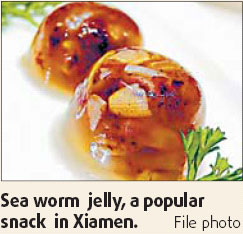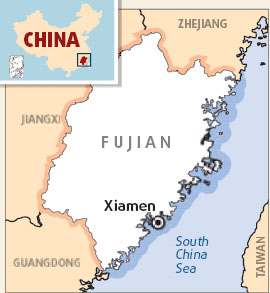My mom was stopped by a visitor one day on Zhongshan Road, the age-old commercial street and city center of Xiamen, Fujian province, who asked her where he could find a genuine local delicacy. After thinking for a while, she answered, "I don't know."
 Well, I should say that is the worst answer that a native of Xiamen, in East China, can give. But my mother had her reasons to be vague.
Well, I should say that is the worst answer that a native of Xiamen, in East China, can give. But my mother had her reasons to be vague.
"I didn't know which one to start with," my mom explained. "The other thing is he emphasized 'the most genuine' food, which you couldn't find in decent restaurants, but mostly tiny places that are scattered in inconspicuous streets and alleys. They are seldom on the map. Visitors will easily get lost unless they have a local guide to tour around."
She is right. I've heard a lot of people who have been there talking about my hometown - how they enjoy the pleasant climate and crystal clean sea, how enchanting Gulangyu Island is, how jealous they feel of local residents, and how they wish to spend their retirement there. Often, they will end such cliched talk with "and the seafood is yummy".
I don't think the seafood distinguishes Xiamen much from other coastal cities in the world. Only when you squeeze into those crowded snack eateries for a cup of peanut soup, or start the day with a casual sip of tieguanyin tea and a sweet stuffing cake, can you feel the soul of this small city of peace and leisure.
For me, the Spring Festival holiday not only means an evening banquet with relatives, but also a reunion with a lot of distinctive snacks and refreshments.
Yet during the vacation, I had the same problem as regular travelers. I stuffed too many fish, crabs and shrimps, leaving not much space for tasty street delicacies. Particularly, I missed one of my favorite snacks that I strongly recommend to future visitors in Xiamen.
 It used to be a common scene that street peddlers carried two baskets on a shoulder pole and hawked tu sun dong. The three characters literally mean soil, bamboo shoot and jelly. Yet the word tu sun has nothing to do with either soil or bamboo shoot. In Xiamen dialect, it refers to a kind of sea worm.
It used to be a common scene that street peddlers carried two baskets on a shoulder pole and hawked tu sun dong. The three characters literally mean soil, bamboo shoot and jelly. Yet the word tu sun has nothing to do with either soil or bamboo shoot. In Xiamen dialect, it refers to a kind of sea worm.
People first soak a handful of such tu sun in water so that the worms spit out mud. Then they press the worms to get rid of the remaining mud, and cook them in boiling water for a few minutes. The final step is to pour the soup and worms into several bowls. The soup will become jelly after it cools down.
Such worm jelly is half crystal colored with white, bamboo-shoot-like worms visible. It may sounds scary but tastes great. And the authentic way to eat it is to dip it into the locally-made sweet pepper sauce, or a mixture of soy and wasabi sauce. If it's summer, you are advised to cool it in the fridge first. The jelly will feel smooth when it fills your mouth, and the worms will be crisp.
(China Daily February 28, 2008)